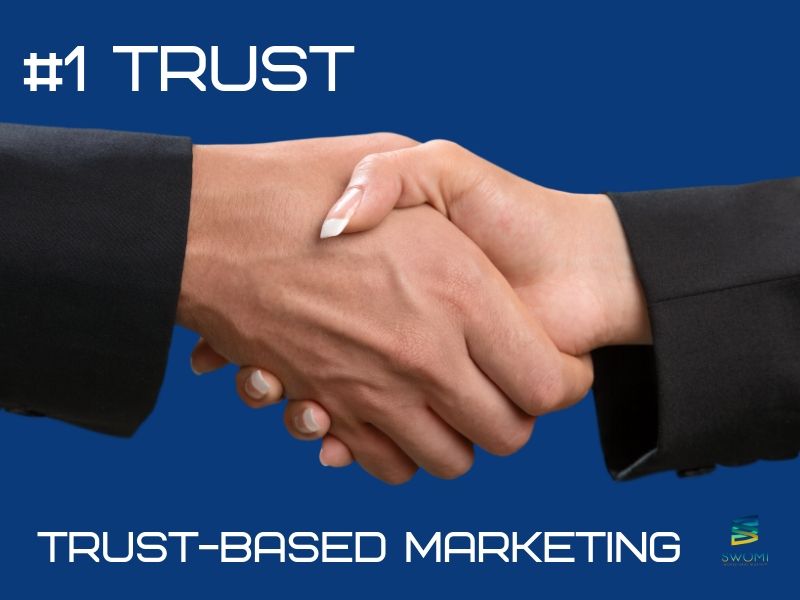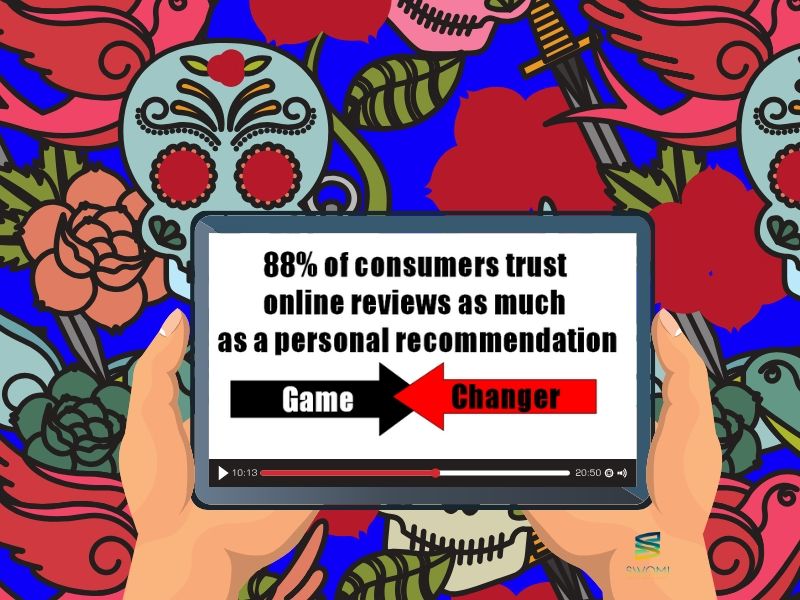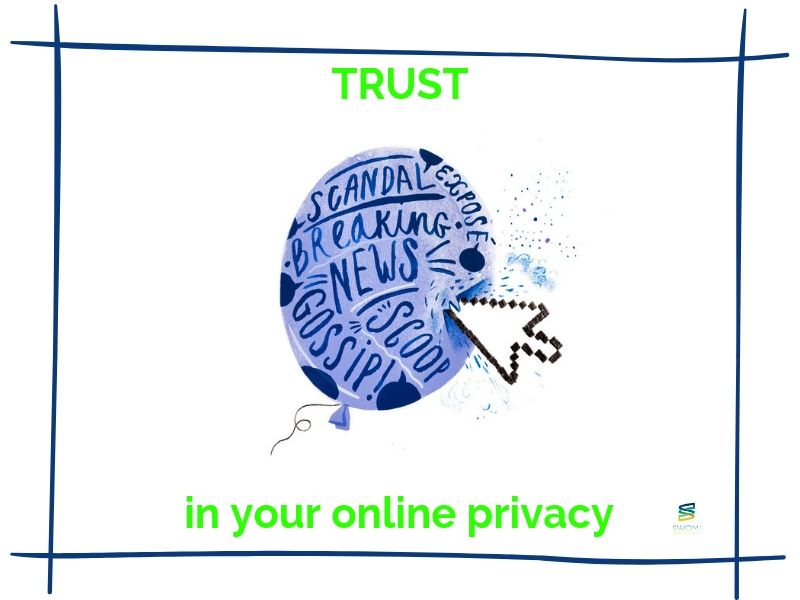The online world trades, exchanges, and creates trust through your content.
https://soundcloud.com/frmlondonwithlove/doves-in-the-sky
This article is letter (T) of our “Trending Topics" series where we write an article for each letter of the phrase. “Trending Topics" looks at what's the hottest, latest, and greatest for the coming new year and beyond. Find links to more articles in the series below.
“Trust” and the “internet.” Just how many times do you see these two drastically different words used in the same sentence?
Never? Once in while?
Lucky for you, you are reading an entire article outlining what is trust, how to trust and protect your online privacy, and why online consumers are most receptive to trust-based marketing.
You are just about to see how much you use your trust-based spider senses you rely on when you go online.
What Is Online Trust?

"The glue that holds all relationships together – including the relationship between the leader and the led – is trust, and trust is based on integrity." – Brian Tracy
We may be communicating through an advanced medium like the internet, but people will still be people no matter what they use to chat.
So naturally, people will look for what to trust and who to trust when they go online.
Trust, after all, is the foundation for any human interaction. Even a level of trust is needed when people interact with objects (you trust your chair won’t break while you sit on it) or an environment (a clean space can make you feel more at ease than an unkempt place).
When exploring the internet, people combine a, mostly unconscious, combination of looking for people to trust, like credible journalists reporting an a political event. Online users are also verifying if they can trust the websites they visit and emails they open (environmental trust).
Building online trust is a bit more nuanced since there is no one to talk to face-to-face. Instead, quality content is a huge indicator of your online credibility. Displaying content on your business’ site like product videos, brand stories in an “About Us” section, and original content goes a long way.
Trust In Your Online Privacy

If you don’t feel safe, how can you trust? That’s why online privacy lays the foundation for feeling safe online.
Unfortunately, online users today can’t trust the websites and platforms they use to protect their data. The numerous security breaches and hacks highlight that sad fact. Facebook’s Cambridge Analytica scandal alone compromised millions of user’s personal information.
That means we are on our own for ensuring our online privacy.
Online privacy is a combination of cyber-environmental awareness and the help of a few privacy tools.
Without getting into anything fancy, simply knowing the signs that cue a sketchy website offers basic online security.
For example, look out for:
- A secure connection in your browser address bar. Secure web addresses are prefixed with https:// rather than the usual http://. Secure connections make it difficult for hackers to snoop by encrypting information coming to and from the the site.
- Trust certificates. Legitimate websites display trust certificate images on their page. The certificates are handed out by Internet trust organizations. Be careful though, counterfeit trust images are sometimes used. To be sure, contact the organization on the trust image.
- Website reviews. Third-party experiences with the website can be found on reviews. Just search the company’s name with “reviews” after it.
If you want to take your online security to the next level, consider taking these actions:
- VPN. The protection isn’t perfect but it’s a huge step up. VPN’s (Virtual Private Network) give you a temporary IP Address to disguise your real one.
- Block third-party cookies. Cookies are the most common way for advertisers to track your browsing habits. The good news? Every major web browser has an option to turn off tracking cookies in their settings.
Do You Trust Information Online?

The internet exploded freedom of expression. Never before has so many people been given a voice that can reach billions of eyes just through a simple online post.
The unexpected side effect of that freedom is sifting through the tons of content to find what is true. When anyone and everyone can post a “fact” online, how can we trust what is true and what is misinformation?
First and foremost, take everything (and we mean everything) online with a grain of salt. A little skepticism can take you a long way when evaluating the authenticity of information.
Not all websites are created equal. They differ in quality, purpose, and bias. Some content was made to be entertaining, not informative (The Onion is a perfect example of this). There’s sponsored content and old, outdated information out there too.
After you have your healthy skepticism spectacles on, it’s time to roll up your sleeves and get fact-checkin’. That’s right. Check yourself before you wreck yourself. How do you do that?
Here are various tips on how to fact-check and verify the information you’re looking at is trustworthy:
- Pay attention to the domain and URL. Established news organizations usually have their own domains
- Read the “About Us” section. Straightforward language about the organization’s leadership, mission, ethics statement is a good sign.
- Look at the quotes in a story and who said them. Quotes can be outright faked. Search them to verify them. Also check if the quote is not distorted out of context.
- Check the comments. If many people are calling this article fake, it’s most likely true.
- Reverse image search. People who write fake stories are not taking their own photos either. Reverse image search to find the original source of the photos.
Trust-Based Marketing

False information... online privacy threats… online users have their radars on high alert at all times. Everything they see online has a “catch” until proven otherwise.
In this cyber world of shadows and mirrors, a source that can build genuine relationships through unbiased information and trustworthy dialogue is invaluable. And this is exactly the stance behind Trust-based marketing.
Trust-based marketing focuses on consumer advocacy to build lifelong customer value. The best way to do that is be honest, open, and upfront about the good and bad of your product.
What does that look like? Well, it looks a lot like one of the number one rules for content marketing. Which is to always provide high quality, unbiased content to your audience that adds real value to their lives. Strategies and tactics are open and honest communication.
Companies who base their business on trust see higher customer retention and more stable revenue streams.
Take Domino’s, for example, when a video went viral of a Domino’s employee’s unsanitary food handling in 2009. So what did Domino’s do? They upfront told everyone how bad they were and their pizza tasted like cardboard. After that, they improved their brand and the taste of their pizza. And it worked. The once struggling company is now worth $9 billion… and makes great pizza, too!
Word Up:
The internet gave us unprecedented connection and instant communication. At the same time, anonymity makes the online world feel like an uncertain place. Trust plays such an important role for that reason.
Without face-to-face interaction, trust is created and exchanged through online content. The more transparent, unbiased, and legitimate online content is, the more the creator of that content will be trusted.
Practicing healthy online privacy practices makes your internet experience less stressful and more enjoyable. You can trust your personal information and computer won’t be compromised when you’re keeping an eye out for it.
The internet’s need for trust is truly a trending topic that will only continue to grow in the coming years.
sources: inc, sellbrite, extremetech, wikihow, realsimple, crisscrossed, askleo, john jay college of criminal justice, npr, wikipedia, study, waldenu
This article is letter (T) of our “Trending Topics" series where we write an article for each letter of the phrase. “Trending Topics" looks at what's the hottest, latest, and greatest for the coming new year and beyond. Find links to more articles in the series below.
(T) The Major (T)rending Topics For 2019
(R) Everyone Is A Brand And Online (R)eviews Decide Your Reputation
(E) What’s Trending In (e)Content
(N) The (N)aked Truth About Your Online Privacy
(D) Surprising (D)ata Predictions For 2019
(I) Stay Ahead Of 2019 With These 11 (I)ntelligent Trends
(N)etwork Personalization And Humanization Create A Human-Centric World
(G) New Kids On The Block: (G)eneration Z And The Future Of Tech
(T)Trust Makes The Online World Go Round
(O) Content Marketing (O)bjectives Are The Bridge To Your Goals
(P) Online (P)rivacy Trends: Your Data Is A Big Deal
(I) 2019 – The Year Of (I)nventions, Innovations, Progress, And Ideas
(C) The In’s And Out’s Of Content (C)uration
(S) Ingredients Of Super (S)hareable Content







